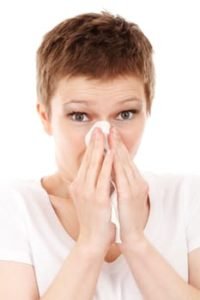 USAG Stuttgart Installation Safety Office
USAG Stuttgart Installation Safety Office
Illnesses like the flu (influenza) and colds are caused by viruses. Flu and cold viruses spread from person to person by way of coughing, sneezing or simply talking. Droplets from an infected person get into the air and are inhaled by people nearby. Anyone within three feet can easily be infected. Flu and cold viruses can also spread when a person touches something that is contaminated with germs and then touches their eyes, nose, or mouth.
Flu and cold viruses can live for hours on surfaces like doorknobs, desks, and tables. Start by learning healthy habits that can help prevent you from getting infected or spreading flu and cold viruses at home, school, or work. Take these precautions even if you don’t feel sick. You could be infected and able to spread germs 24 hours before your symptoms begin.
How to help stop the spread of germs
Maintain your health to keep your immune system in good shape. Get plenty of sleep, be physically active, manage your stress, drink plenty of fluids, and eat nutritious food. The healthier you are, the better your immune system will be at defending your body against a virus.
Cover your mouth and nose when you sneeze or cough. Cough or sneeze into a tissue and then dispose of tissues where others will not contact them. If you do not have a tissue, cover your cough or sneeze with your shirt sleeve at the elbow bend of your arm. Be sure to clean your hands every time after you cough or sneeze.
Clean your hands often. When available, wash your hands — with soap and warm water — then rub your hands vigorously together and scrub all surfaces. Wash for 15 to 20 seconds. It is the soap combined with the scrubbing action that helps dislodge and remove germs. When soap and water are not available, alcohol-based disposable hand wipes or gel sanitizers may be used. You can find them in most supermarkets and drugstores. If using a gel, rub the gel in your hands until they are dry. The gel doesn’t need water to work; the alcohol in the gel kills germs that cause colds and the flu.
Avoid touching your eyes, nose, or mouth. Germs are often spread when a person touches something that is contaminated with germs and then touches their eyes, nose, or mouth. Germs can live for a long time (some can live for two hours or more) on surfaces like doorknobs, desks, and tables.
Don’t share utensils or drinks. In cafeteria settings, it’s not uncommon for people to casually share utensils or take a sip from someone’s drink. This should be completely avoided if there is any risk of a flu pandemic.
Stay home when you are sick and check with a health care provider when needed. When you are sick or have flu symptoms, stay home, get plenty of rest, and check with a health care provider as needed. You may need a doctor’s note for an excused absence, but keeping your distance from others may protect them from getting sick. Common symptoms of the flu include fever (usually high), headache, extreme tiredness, cough, sore throat, runny or stuffy nose, muscle aches, and, nausea, vomiting, and diarrhea.
Get plenty of sleep, be physically active, manage your stress, drink plenty of fluids, and eat nutritious food. Practicing healthy habits will help you stay healthy during flu outbreaks all year long.
